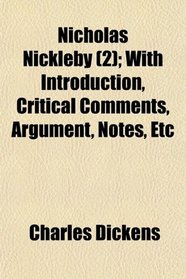Search -
Nicholas Nickleby (2); With Introduction, Critical Comments, Argument, Notes, Etc
Nicholas Nickleby With Introduction Critical Comments Argument Notes Etc - 2
Author:
Volume: 2 General Books publication date: 2009 Original publication date: 1908 Original Publisher: University Society Subjects: Fiction / Classics Fiction / Literary Literary Criticism / General Literary Criticism / European / English, Irish, Scottish, Welsh Notes: This is a black and white OCR reprint of the original. It has no il... more »
Author:
Volume: 2 General Books publication date: 2009 Original publication date: 1908 Original Publisher: University Society Subjects: Fiction / Classics Fiction / Literary Literary Criticism / General Literary Criticism / European / English, Irish, Scottish, Welsh Notes: This is a black and white OCR reprint of the original. It has no il... more »
ISBN-13: 9781150690280
ISBN-10: 1150690283
Publication Date: 12/22/2009
Pages: 322
Rating: ?
ISBN-10: 1150690283
Publication Date: 12/22/2009
Pages: 322
Rating: ?
0 stars, based on 0 rating




